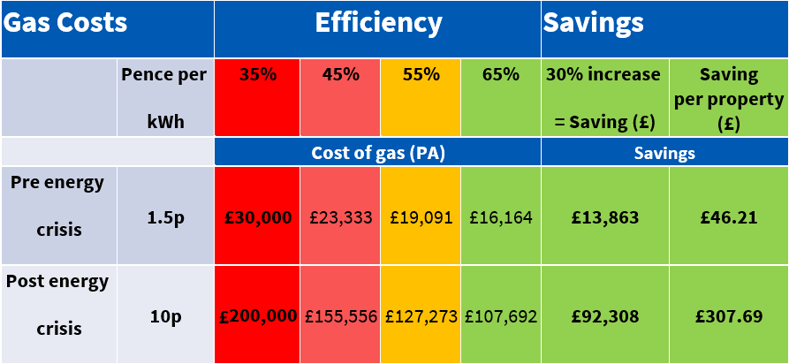It is often commonplace in the UK for communal heating systems to be underperforming. Heat network efficiency is not only critical to reducing operating costs and carbon, but it also plays a crucial role in helping tackle rising resident debt.
What is heat network efficiency?
It can be argued that calculating the efficiency of a heat network is the most common way to work out how well your communal heating system is performing. In the UK, it’s common for heat networks to operate at 30-45% efficient as standard, due to the lack of expertise and knowledge around how to effectively build, operate and maintain them. A heat network will never be 100% efficient as operators are limited by the efficiency of the boilers and the build of the network itself, for example whether the correct insulation has been used, the right size pipes and how the network is operated and maintained once it has been commissioned. It’s not unrealistic however to be able to increase the efficiency of a heat network from 35% efficient, to 65% efficient with effective maintenance and targeted improvements through schemes such as the Heat Network Efficiency Scheme (HNES).
Heat network efficiency can be calculated by dividing the amount of heat used by the amount of gas used. For example, if your scheme had an annual gas consumption of 100,000kWh and an annual heat demand of 50,000 kWh, your scheme would be 50% efficient because only half of the energy generated is being used by the communal heating system.
Unlike standard heating systems e.g., individual gas boilers per property, communal heating systems must be designed, built, and operated to maximum efficiency. This is because communal heating systems are not ‘on demand’ like conventional heating, with hot water continuously being circulated and brought back to a central energy centre. Therefore, it’s crucial to ensure your communal heating system is as efficient as possible, particularly in today’s economic climate.
To put this into perspective, imagine how much it would cost you and your residents to have the gas boiler on constant? Bills would soar, and the equipment would break down much more quicky. The same thing happens to a heat network which doesn’t work efficiently.
What are the benefits of an efficient communal heating to residents?
There are several benefits to an efficient heat network to residents. Firstly, residents can expect a more reliable system which performs better, meaning less disruption for those who are supplied by the heat network.
Secondly, an efficient heat network can help considerably when it comes to tariffs and standing charges. An efficient heat network consumes less gas to produce the same amount of heat, therefore the gas bill for the operator is considerably reduced and this reduction in costs can then be passed on to the residents via their tariff, as operators have less costs to recover.
As an example of the difference an efficient heat network can make to the overall gas bill of a communal heating system, see the calculations below. These figures are based on a scheme of 300 residential units using 3500 kWh per annum, per property.

How can the efficiency of communal heating impact the tariff?
During the current energy crisis, operators need ways to reduce the tariffs on communal heating schemes to support their residents with energy bills and indeed, to reduce their own operating costs as the price of gas remains high.
As mentioned in the previous paragraph, a communal heating system which is operating more efficiently will consume less gas to create the same amount of heat, than a system which is not efficient. This in turn reduces the gas bill and this reduction can then be passed on to the residents via a reduced tariff.
As an example of the impact which an efficient heat network can have on the tariff, Scheme A which Switch2 operate as an ESCo which has an efficiency of 62%. As a result of the efficient operation on the heating system, the residents will benefit from a tariff which is 51% lower than the average scheme, which operates at between 35-45% efficient.
This reduction in tariff means that less residents are likely to fall into fuel poverty. This in turn reduces the risk to operators, as it means that debt levels on communal heating schemes are less likely to rise significantly, ensuring operators do not have to find a way to cover the shortfall on their own gas bill.
How can the efficiency of communal heating be improved?
Improving the efficiency of your communal heating system is not something that can be achieved overnight. It requires continuous monitoring and improvement over a period for operators and residents to see results.
The first place to start when looking at the efficiency of a heat network is data-driven operations and maintenance. Through data-driven operations and maintenance, operators can begin to monitor and analyse the return temperatures in the plant room and the volume to energy ratio of the heat network which can be used to identify problems on the heat network. A specialist contractor, who understand this data can then deploy engineers to make targeted interventions to improve the performance of the heating system by resolving the issues. Once this has been done, operators should continue to monitor and analyse the communal heating system using data to proactively identify any further issues and continue to fix and improve.
Operations and maintenance should not simply be a tick box exercise as it often has been in the past, as this will not contribute to improving the efficiency, reliability, or performance of the communal heating systems.
How can Switch2 help?
As a specialist heat network operator, Switch2 have over 40 years’ experience in operating and maintaining heat networks. We have the skills and the expertise to help operators to monitor, analyse and improve their communal heating systems.
If you’d like to find out how much you could be saving by improving the efficiency of your communal heating system, why not try our Heat Network Efficiency Savings calculator. If you’d like to speak to one of our team about how we can help to improve the efficiency of your heat network, simply fill out the form below and we’ll get back to you as soon as we can.


